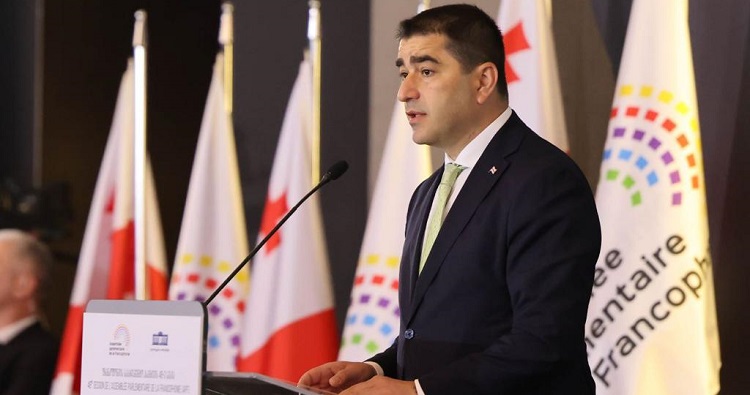Parliament Speaker: political objective of NATO accession “bringing Georgians together”

In his open letter ahead of the NATO Summit that will kick off on Tuesday in Lithuania’s capital city of Vilnius, Papuashvili noted “Georgia seems to be hitting a glass door since there is nothing left of the arguments against Georgia's membership in NATO”. Photo: Parliament of Georgia
Georgian Parliament Speaker Shalva Papuashvili on Monday said the country’s accession to NATO was a “political objective” that was “bringing Georgians together”.
In his open letter ahead of the NATO Summit that will kick off on Tuesday in Lithuania’s capital city of Vilnius, Papuashvili noted “Georgia seems to be hitting a glass door since there is nothing left of the arguments against Georgia's membership in NATO”.
If Georgians are united by any political goal, it is primarily Georgia's accession to NATO, which, unfortunately, does not depend only on us. [...] It is true that the alliance announced at the 2008 Bucharest summit that Georgia would become a member of NATO, but since then, little had changed qualitatively in NATO's approach to Georgia's membership”, Papuashvili said.
The country’s chief legislator stressed the country had “fundamentally” changed its democratic institutions, left behind an “authoritarian” system of governance, and approximated its defence capabilities to NATO standards over the last decade, and pointed out that “NATO only repeats the promise of membership from summit to summit”.
“It is true that Georgia-NATO political and military cooperation has increased significantly and Georgia has received substantial assistance from the alliance, but, qualitatively, little has changed in NATO's inert approach to the critically important issue of Georgia's accession”, Papuashvili continued.
Georgia’s NATO membership should be above partisan politics
— Shalva Papuashvili ???????? (@shpapuashvili) July 10, 2023
If a political goal can ever unite Georgians, then Georgia’s NATO membership comes first to mind, which, sadly, is not only up to us to decide. In November 2002, having just applied for the Alliance membership and… pic.twitter.com/xaPdoCxEzT
“At the time, there were serious doubts about Georgia's readiness, especially on the backdrop of the authoritarian and spontaneous rule of [former President] Mikheil Saakashvili, but today Georgia seems to be hitting a glass door, since nothing is left of the arguments against Georgia's membership in NATO”, the Parliament official noted.
Papuashvili claimed if Georgia had been a member of NATO in 2008, there would have been “neither the war nor the Russian occupation” - in reference to the conflict that broke out that year - that made security challenges of not only Georgia but also the region “more difficult”.
Rejecting Georgia’s NATO bid [back in 2008] may have contributed to [Russia’s] attack on Ukraine. NATO's borders are the borders of peace. The greatest threat to Georgia's and regional peace and stability is ambiguity that can be easily exploited by aggressive forces in legal, political and military terms”, he said.
Papuashvili also said there had been “traditionally four clusters of doubts raised by sceptics” to create obstacles to Georgia's membership progress.
The first [doubt] was related to trust and commitment, but Georgia passed this test with flying colors. In the last three decades, since the Partnership for Peace initiative, Georgia has tacitly confirmed its commitment to the values and policies of the Euro-Atlantic family. [...] The second [doubt] was related to the lack of democratic credentials. And it has been dealt head-on by the Georgian Dream government in the last decade. Every authoritative international ranking gives ample evidence for this claim”, he noted.
“The third [doubt] concerning the shortcomings of the defence capability have also been addressed. All NATO members would agree with this statement. Today, the Georgian Defence Forces are distinguished by their capabilities, and more than 80 percent of them are experienced in international military missions”, Papuashvili continued.
He also said the fourth point was about whether Georgia's accession to NATO would contribute to regional stability, or, on the contrary, “irritate” Russia more and provoke its aggression, thereby harming the chances of restoring Georgia's territorial integrity, and added “now we can confidently say that only a decisive response can prevent such a disaster as Russia's aggression in Ukraine”.
It is a pity that some Eastern European countries, which were once the most ardent supporters of Georgia's accession to NATO and the European Union, have become sceptics today, only because their political partner force in Georgia is in the opposition and not in the Government”, he said in reference to the domestic opposition United National Movement party.
“Alienating Georgia from NATO, at this historic juncture, just because of differing political tastes, is a mistake that the future will not forgive. Georgia’s NATO membership should stand above partisan politics”, Papuashvili concluded.
 Tweet
Tweet  Share
Share